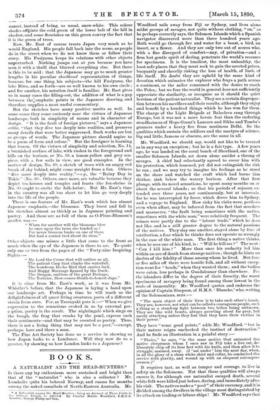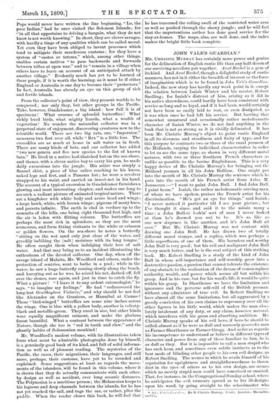BOOKS.
A NATURALIST AND THE HEAD-HUNTERS.* Is there any lay enthusiasm more sustained and bright than that of the " naturalist " who is also a collector ? Mr. Lumholtz quits his beloved Norway, and roams for months among the naked cannibals of North-Eastern Australia. Mr.
• A Nat u ralist among the Head-Hunters being an Account of Three Visits to the Solomon Islands in 1886-74 By Charles Morris Woodford, F.R.G.S. London; George Philip and Son.
Woodford sails away from Fiji or Sydney, and lives alone- midst groups of savages, not quite without clothing, " on," as he perhaps correctly says, the Solomon Islands which a Spanish navigator discovered more than three hundred years ago. Both would go through fire and water for a beast, a bird, an insect, or a flower. And they are only two out of scores who, with a fine disregard of comfort—nay, of privation—and a firm but gentle spirit of daring, penetrate the world's recesses for specimens. It is the loneliest, the most unhealthy, the least safe places that they must seek to gain the coveted prizes, buoyantly and cheerily risking the loss of health, of limb, of life itself. No doubt they are upheld by the same kind of devotion which animates the explorer who frays a path across a continent, or the sailor consumed with the desire to reach the Poles ; but we fear the world in general does not sufficiently appreciate the similarity, or recognise as it should the quiet heroism of the patient naturalist. They see a certain dispropor- tion between his sacrifices and their results, although they enjoy and benefit by a hundred things which he has won for them.
The charge of the Light Brigade at Balaclava rang through Europe, but it was not a more heroic feat than the enduring steadfastness of Hope Grant's Lancers and Sikhs and Tombs's gunners under a heavy fire from mutinous Delhi. So the qualities which sustain the soldiers and the martyrs of science, big and little, famous or obscure, are the same in all.
Mr. Woodford, we should say, would not like to be treated as in any way an exception ; but he is a fair type. A few years ago, he was landed on the coral beach of Shortland, one of the smaller Solomon Islands, set down alone amidst a throng of savages. A chief had reluctantly agreed to cover him with
his protection, which lessened, yet did not extinguish the risk he ran ; and we may try to imagine his feelings as he stood on the shore and watched the craft which had borne him thither, sink below the watery horizon. After that first plunge, with its novel sensations, he spent many months on or about the several islands ; so that his periods of sojourn ex- tended over three years, not continuously, but at intervals, for he was interrupted by fever, which drove him to Sydney, and a voyage to England. How risky his visits were, perilous even when afloat, may be inferred from the fact that murders
and massacres, "the fault being sometimes with the native, sometimes with the white man," were relatively frequent. The crimes were partly due to the " labour trade," which he does not like, and in a still greater degree to the natural passions of the natives. They slay one another, stayed alone by fear of retribution, a fear which he thinks does not operate so strongly in the case of the white man. The first thing a native thinks, when he sees one of his kind, is : " Will he kill me ?" The next : " Can I kill him ? " More than once his audacity led him within an ace of death from strange natives ; though he hints no doubts of the fidelity of those among whom he lived. But four or five miles off there were hostile folk, and all without excep- tion went for " heads," when they wanted them ; and the bodies. were eaten, less perhaps in Guadalcanar than elsewhere. For the islanders differ in the degree of their ferocity, the worst specimens of savagery being found among those lowest in the scale of immorality. Mr. Woodford quotes and endorses the opinion of Captain Simpson, of H.M.S. Blanche,' who, writing of the Solomonians, says :-
" The main object of their lives is to take each other's heads. They are, however, not what can be called a courageous people, such a thing as a stand-up fight between two tribes being unknown. They are like wild beasts, always prowling about for prey, but rarely attacking unless they feel that they have their victims in their power."
They have "some good points," adds Mr. Woodford, " but in their nature reigns unchecked the instinct of destruction." And he finds an illustration in a painful story :—
" Theirs," he says, " is the same motive that animated the native clergyman whom I once saw in Fiji take a live rat, de- liberately chop off its four feet with his knife, and then allow it to struggle, maimed, away. (I 'sat under' him the next day, when, in all the glory of a clean white shirt and collar, he conducted the service with gravity, and wound up with an eloquent extempore sermon.)"
It requires tact, as well as temper and courage, to live in safety on the Solomons. Not that these qualities will always ensure it, for although our naturalist escaped death, several white folk were killed just before, during, and immediately after his visit. The natives make a " pool" of their currency, and it is divided among the dwellers in the village most distinguished by its attack on trading or labour ships ! Mr. Woodford says that Pope would never have written the line beginning, " Lo, the poor Indian," had he once visited the Solomon Islands ; for "in all that appertains to driving a bargain, what they do not know is not worth knowing." In short, they are clever savages, with hardly a tinge of any qualities which can be called moral. Yet even they have been obliged to invent processes which tend to mitigate their murderous customs ; for they have a system of "castes or totems," which, among other things, enables certain natives " to pass backwards and forwards between tribes at open war," and to " remain in a village when others have to leave on account of an anticipated attack by another village." Evidently much has yet to be learned of these people, if it is worth the learning, as it must be if either England or Australia is one day to become their "protectors." In fact, Australia has already an eye on this group of rich and fertile islands.
From the collector's point of view, they present worlds to be conquered ; nor only they, but other groups in the Pacific. Take, however, Guadalcanar, a big island : how full it is of specimens!! What swarms of splendid butterflies ! What richly hued birds, what mighty lizards, what a wealth of vegetation ! No wonder the naturalist collector was in a perpetual state of enjoyment, discovering creatures new to the scientific world. There are two big rats, one, " Imperator," measures two feet over all, while " Rex " is a little less. The crocodiles are as much at home in salt water as in fresh. There are many kinds of bats, and our collector has added "two new genera and five new species to the list of known bats." He lived in a native leaf-thatched but on the sea-shore, and thence, with a clever native boy to carry his gun, he made daily excursions into the jungle. His attire was simply a flannel shirt, a piece of blue calico reaching to his knees, naked legs and feet, and a Panama hat ; he wore a revolver strapped to his waist, and carried an insect-net in his hand. The account of a typical excursion in Guadalcanor furnishes a glowing and most interesting chapter, and makes one long to see such a radiant picture of animated tropical nature, There are a kingfisher with white body and azure head and wings ; a large hawk, white, with brown wings ; pigeons of many hues, and parrots infinite. The earth is clad in verdure up to the summits of the hills, one being eight thousand feet high, and the air is laden with flitting colours. The butterflies are perhaps the most rich in splendors•, as they are the most numerous, and form fitting visitants to the white or crimson or golden flowers. On the sea-shore he notes a butterfly "sitting on the wet sand only just clear of the water, and greedily imbibing the [salt] moisture with its long tongue." He often caught them when indulging their love of salt water. And that may bring us to an incident illustrating the enthusiasm of the devoted collector. One day, when off the savage island of Malaita, Mr. Woodford and others, under the protection of sentries, went to bathe in a pool ; while in the water, he saw a huge butterfly coming slowly along the beach, and, hurrying out as he was, he seized his net, dashed off, fell over the stones, rose again, and just in time to catch the fly. What a picture ! " I leave it to any ardent entomologist," he says, " to imagine my feelings." He had " rediscovered the long-lost Ornithoptera Victoria," and why should he not feel like Alexander on the Granicus, or Hannibal at Cannes These " bird-winged " butterflies are some nine inches across the wings. One is blue with a yellow body, another is velvety- black and metallic-green. They excel in size, but other kinds wear equally magnificent raiment, and make the glorious forest beautiful. What a contrast between the appearance of Nature, though she too is " red in tooth and claw," and the ghastly habits of Solomonian mankind !
Mr. Woodford's modest volume, with its illustrations taken from what must be admirable photographs done by himself, is a genuinely good book of its kind, and full of solid informa- tion as well as of pleasant reading. The mysteries of the Pacific, the races, their migrations, their languages, and still more, perhaps, their customs, have yet to be sounded and explained. Some suggestions, at least as regards the move- ments of the islanders, will be found in this volume, where it is shown that they do actually communicate with each other, by design as well as accident, over long oceanic distances. The Polynesian is a maritime person ; the Melanesian keeps to his lagoons and deep channels between the islands, for he has not yet reached the sail, and tugs the oar, or rather, plies the paddle. When the reader closes this book, he will feel that he has traversed the rolling swell of the restricted water area as well as pushed through the showy jungle; and he will feel that the unpretentious author has done good service for the stay-at-homes. The maps, also, are well done, and the index makes the bright little book complete.







































 Previous page
Previous page